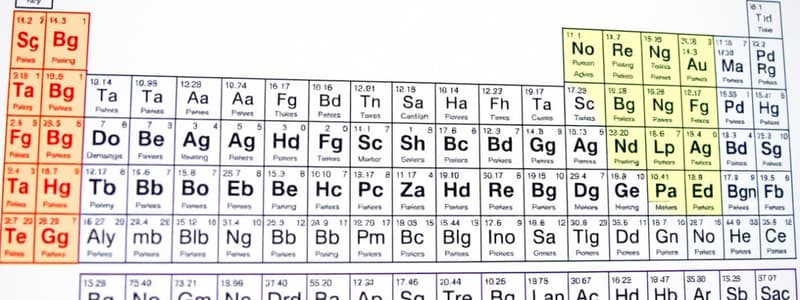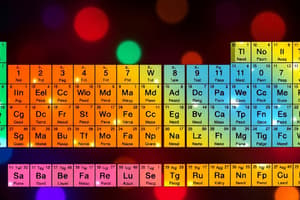Podcast
Questions and Answers
What is a periodic table?
What is a periodic table?
- A type of chemical reaction
- An arrangement of compounds
- A collection of isotopes
- A chart that organizes the elements (correct)
What is an element?
What is an element?
Pure substance that consists entirely of one type of atom
What are the vertical columns of the periodic table called?
What are the vertical columns of the periodic table called?
Groups
How many groups are in the periodic table?
How many groups are in the periodic table?
What are the horizontal rows of the periodic table called?
What are the horizontal rows of the periodic table called?
How many periods are in the periodic table?
How many periods are in the periodic table?
Who invented the periodic table?
Who invented the periodic table?
What are physical properties?
What are physical properties?
What are chemical properties?
What are chemical properties?
What are noble gases?
What are noble gases?
What is atomic mass?
What is atomic mass?
What is relative atomic mass?
What is relative atomic mass?
What is atomic number?
What is atomic number?
Flashcards are hidden until you start studying
Study Notes
Periodic Table Overview
- A periodic table organizes elements by chemical properties and increasing atomic number.
Elements
- An element is a pure substance composed entirely of one type of atom.
- Cannot be broken down into simpler substances.
Groups
- Vertical columns in the periodic table are known as groups.
- Elements within the same group exhibit similar chemical properties and share the same number of outer shell electrons.
- There are eight main groups in the periodic table.
Group Examples
- Group 1 contains highly reactive metals, such as sodium (Na).
- Group 7 consists of reactive non-metals, including chlorine (Cl).
Periods
- Horizontal rows in the periodic table are referred to as periods.
- Elements in the same period share the same number of occupied electron shells, numbered from top to bottom.
- The periodic table has seven naturally occurring periods.
Extended Periodic Table
- An eighth period includes elements that may be synthesized after 2016, recognized in the extended periodic table.
Historical Context
- The periodic table was first organized by Russian chemist Dmitri Mendeleev.
- Mendeleev arranged elements according to atomic mass.
Physical Properties
- Observable and measurable characteristics that do not change a substance's identity.
- Examples include melting and boiling points, electrical conductivity.
Chemical Properties
- Observed only when a substance undergoes a change in composition.
- Examples include reactivity and acidity/alkalinity.
- Determined by the number of outer shell electrons, hence elements in the same group have similar chemical properties.
Noble Gases
- Group 8 elements are noble gases, characterized as unreactive and odorless at room temperature.
- They possess a full outer shell of electrons.
Atomic Concepts
- Atomic mass refers to the total number of protons and neutrons in an atom.
- Relative atomic mass (Ar) is the weighted average of the isotopes of an element.
- The atomic number signifies the number of protons in an atom's nucleus.
Studying That Suits You
Use AI to generate personalized quizzes and flashcards to suit your learning preferences.




